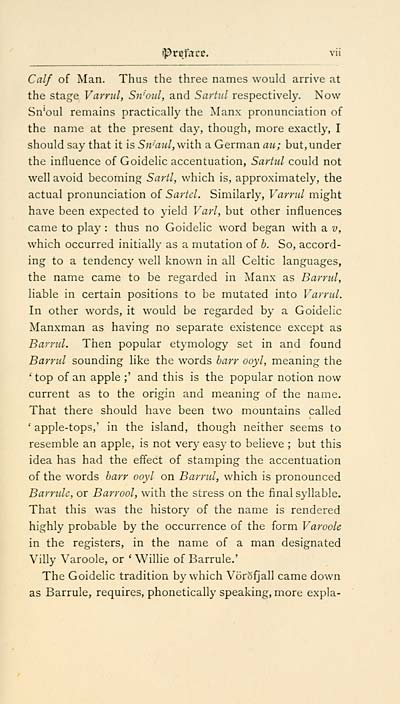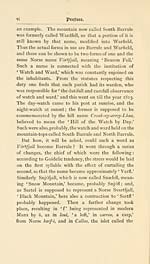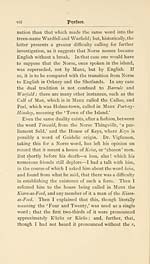Download files
Complete book:
Individual page:
Thumbnail gallery: Grid view | List view

jpr^f'tcc.
Calf of Man. Thus the three names would arrive at
the stage Varriil, Sn'oiil, and Sartiil respectively. Now
Sn'oul remains practically the Manx pronunciation of
the name at the present day, though, more exactly, I
should say that it is Sn' aid, with a German an; but, under
the influence of Goidelic accentuation, Sartid could not
well avoid becoming Sartl, which is, approximately, the
actual pronunciation of Sartel. Similarly, Varrid might
have been expected to yield Varl, but other influences
came to play : thus no Goidelic word began with a v,
which occurred initially as a mutation of b. So, accord-
ing to a tendency well known in all Celtic languages,
the name came to be regarded in Manx as Barrid,
liable in certain positions to be mutated into Varrid.
In other words, it would be regarded by a Goidelic
Manxman as having no separate existence except as
Barrid. Then popular etymology set in and found
Barrul sounding like the words barr ooyl, meaning the
'top of an apple ;' and this is the popular notion now
current as to the origin and meaning of the name.
That there should have been two mountains called
' apple-tops,' in the island, though neither seems to
resemble an apple, is not very easy to believe ; but this
idea has had the effect of stamping the accentuation
of the words barr ooyl on Barrid, which is pronounced
Barrulc, or Barrool, with the stress on the final syllable.
That this was the history of the name is rendered
highly probable by the occurrence of the form Varoole
in the registers, in the name of a man designated
Villy Varoole, or ' Willie of Barrule.'
The Goidelic tradition by which VorSfjall came down
as Barrule, requires, phonetically speaking, more expla-
Calf of Man. Thus the three names would arrive at
the stage Varriil, Sn'oiil, and Sartiil respectively. Now
Sn'oul remains practically the Manx pronunciation of
the name at the present day, though, more exactly, I
should say that it is Sn' aid, with a German an; but, under
the influence of Goidelic accentuation, Sartid could not
well avoid becoming Sartl, which is, approximately, the
actual pronunciation of Sartel. Similarly, Varrid might
have been expected to yield Varl, but other influences
came to play : thus no Goidelic word began with a v,
which occurred initially as a mutation of b. So, accord-
ing to a tendency well known in all Celtic languages,
the name came to be regarded in Manx as Barrid,
liable in certain positions to be mutated into Varrid.
In other words, it would be regarded by a Goidelic
Manxman as having no separate existence except as
Barrid. Then popular etymology set in and found
Barrul sounding like the words barr ooyl, meaning the
'top of an apple ;' and this is the popular notion now
current as to the origin and meaning of the name.
That there should have been two mountains called
' apple-tops,' in the island, though neither seems to
resemble an apple, is not very easy to believe ; but this
idea has had the effect of stamping the accentuation
of the words barr ooyl on Barrid, which is pronounced
Barrulc, or Barrool, with the stress on the final syllable.
That this was the history of the name is rendered
highly probable by the occurrence of the form Varoole
in the registers, in the name of a man designated
Villy Varoole, or ' Willie of Barrule.'
The Goidelic tradition by which VorSfjall came down
as Barrule, requires, phonetically speaking, more expla-
Set display mode to: Large image | Transcription
Images and transcriptions on this page, including medium image downloads, may be used under the Creative Commons Attribution 4.0 International Licence unless otherwise stated. ![]()
| Early Gaelic Book Collections > Blair Collection > Surnames & place-names of the Isle of Man > (11) |
|---|
| Permanent URL | https://digital.nls.uk/82099780 |
|---|
| Description | A selection of books from a collection of more than 500 titles, mostly on religious and literary topics. Also includes some material dealing with other Celtic languages and societies. Collection created towards the end of the 19th century by Lady Evelyn Stewart Murray. |
|---|
| Description | Selected items from five 'Special and Named Printed Collections'. Includes books in Gaelic and other Celtic languages, works about the Gaels, their languages, literature, culture and history. |
|---|

